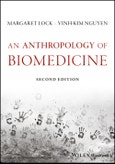In this fully revised and updated second edition of An Anthropology of Biomedicine, authors Lock and Nguyen introduce biomedicine from an anthropological perspective, exploring the entanglement of material bodies with history, environment, culture, and politics. Drawing on historical and ethnographic work, the book critiques the assumption made by the biological sciences of a universal human body that can be uniformly standardized. It focuses on the ways in which the application of biomedical technologies brings about radical changes to societies at large based on socioeconomic inequalities and ethical disputes, and develops and integrates the theory that the human body in health and illness is not an ontological given but a moveable, malleable entity.
This second edition includes new chapters on: microbiology and the microbiome; global health; and, the self as a socio-technical system. In addition, all chapters have been comprehensively revised to take account of developments from within this fast-paced field, in the intervening years between publications. References and figures have also been updated throughout.
This highly-regarded and award-winning textbook (Winner of the 2010 Prose Award for Archaeology and Anthropology) retains the character and features of the previous edition. Its coverage remains broad, including discussion of: biomedical technologies in practice; anthropologies of medicine; biology and human experiments; infertility and assisted reproduction; genomics, epigenomics, and uncertain futures; and molecularizing racial difference, ensuring it remains the essential text for students of anthropology, medical anthropology as well as public and global health.
Table of Contents
Acknowledgements xiii
Introduction 1
The Argument 1
Interwoven Themes 2
Improving Global Health: The Challenge 4
Biomedicine as Technology 5
Does Culture Exist? 7
A word About Ethnography 10
Section 1
1 Biomedical Technologies in Practice 15
2 The Normal Body 29
3 Anthropologies of Medicine 51
Section 2
4 Colonial Disease and Biological Commensurability 79
5 Grounds for Comparison: Biology and Human Experiments 103
6 The Right Population 127
Section 3
7 Who Owns the Body? 161
8 The Social Life of Human Organs 185
9 Making Kinship: Infertility and Assisted Reproduction 213
Section 4
10 The Sociotechnical Self 241
11 Genes as Embodied Risk 265
12 Global Health 291
Section 5
13 From Local to Situated Biologies 313
14 Of Microbes and Humans 335
15 Genomics, Epigenomics and Uncertain Futures 349
16 Molecularizing Racial Difference 371
Epilogue 385
Notes 389
Bibliography 467
Index 529








